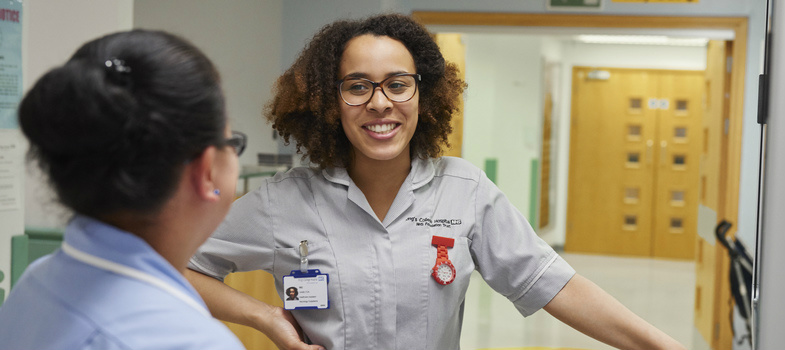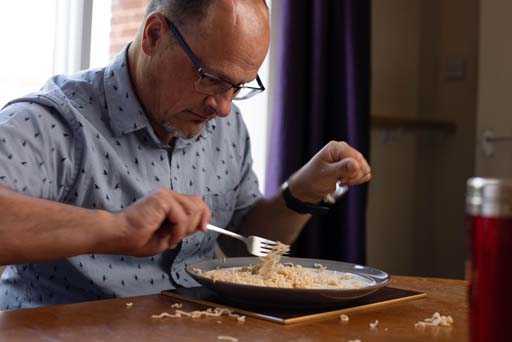2.7 Eating and drinking difficulties
Many people with Parkinson’s have some difficulties with eating and swallowing. The medical term for this is dysphagia.
There are many reasons why people with Parkinson’s may experience difficulties with eating and drinking. Many of these relate to their mobility problems. Chewing can be difficult and Parkinson’s can cause difficulties in the muscles of the tongue.
While eating, frequent swallowing may mean that saliva is used up, causing a dry swallow, which can feel uncomfortable. Also, some Parkinson’s medications can alter the taste in a person’s mouth or cause a dry mouth. A person with Parkinson’s may have swallowing problems if they have any of these symptoms:
- loss of appetite
- weight loss
- drooling
- inability to clear food from the mouth
- food sticking in the throat
- a gurgly voice
- coughing when eating or drinking
- choking on food, liquids or saliva
- problems swallowing medication
- pain when swallowing
- discomfort in the chest or throat
- heartburn or reflux
- repeated chest infections.
These symptoms can impact on people’s health and their enjoyment of food.
What can help?
Speech and language therapists can help with exercises and techniques to overcome some problems with eating and swallowing. Following an assessment, a speech and language therapist will develop a management plan to suit individual needs that might include:
- adjusting a person’s posture and head position when eating or drinking
- using special equipment to help them eat and drink more safely and comfortably
- exercises to strengthen their lip, tongue and throat muscles to make their swallowing more effective
- changing their diet to make foods and liquids easier and safer to swallow – this may include avoiding hard, dry or crumbly foods, or thickening drinks to make them move more slowly in the mouth
- talking to their GP, specialist or Parkinson’s nurse about the timing and doses of medication, as eating meals shortly after taking some medications may improve swallowing
- improving breathing techniques.
‘You have to monitor yourself, take your drugs when you should. I do notice when I have excesses of protein, a t-bone steak or whatever, that my medication is slow to work.’
Sometimes issues with eating and drinking are not to do with the physical aspects of swallowing, but more to do with the practicalities of eating and drinking. Occupational therapists can provide advice and equipment, and dietitians can advise on suitable foods.
In a care or hospital environment, food may often be taken from a person with Parkinson’s because the professional assumes that they don’t want it. This may be because the person is taking a long time to eat or because the food has gone cold and looks unappetising.
People with Parkinson’s may need a lot of time to enjoy eating on their own or they may need your help at every meal.
Actions to take
- Report any problems. Your client may benefit from seeing a speech and language therapist, occupational therapist or dietitian.
- Look at how well they can use and coordinate their hands.
- If they want to eat on their own, allow them lots of time as they may be slow.
- Make sure they drink enough fluids.
- Your client might find specially designed cutlery or cups useful – an occupational therapist can advise on the best ones to use.
- Check if the person has problems with chewing and swallowing, which could cause choking or breathing problems.
- If it takes a long time for someone to eat, you could give them half of the meal and keep the other half warm until they are ready to eat it.
- Some people may lose weight as a result of eating difficulties. The dietitian can offer advice about getting a good diet and about the types of food that may be easier to swallow. They may also recommend nutritional supplements.
2.6 Non-motor symptoms

